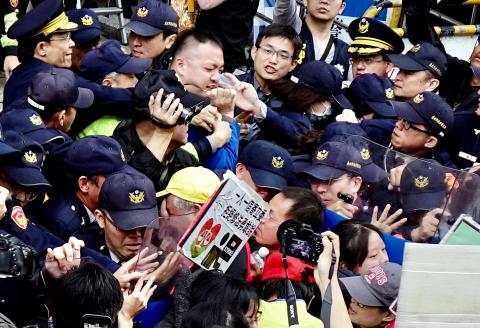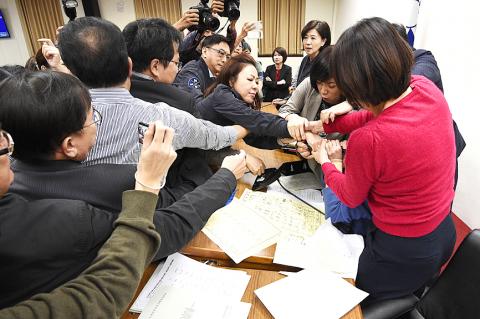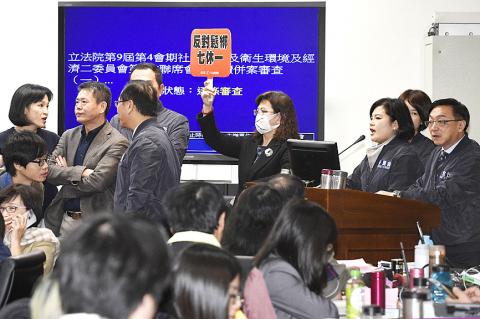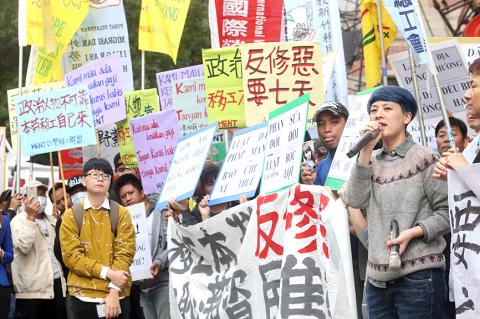Scuffles broke out among lawmakers yesterday at a meeting of the legislature’s Economics Committee and Social Welfare and Environmental Hygiene Committee, as they began reviewing proposed amendments to the Labor Standards Act (勞動基準法).
The review, which was scheduled to start at 9am, did not begin until after 11am. Later, a motion to extend the review to midnight was passed.
New Power Party (NPP) and Chinese Nationalist Party (KMT) lawmakers tried to boycott the review by disputing the time limit for each lawmaker’s speech, but dissenters were forcibly carried away from the podium by Democratic Progressive Party (DPP) members.

Photo: Chien Jung-fong, Taipei Times
DPP Legislator Lin Shu-fen (林淑芬) tendered a motion to amend articles 32, 34 and 36 of the act.
The Cabinet’s draft bill would amend Article 32 to cap an employee’s working hours at 138 hours every three months, while Lin proposed that it be changed to 138 hours for three “consecutive” months.
As for Article 34, the Cabinet’s version would require at least 11 hours of rest between shifts, which could be shortened to eight hours if employers and employees reach a consensus.

Photo: Chen Chih-chu, Taipei Times
While the Cabinet plans to loosen the “one rest day” rule by amending Article 36, Lin proposed maintaining the version that was passed in December last year.
A motion tendered by DPP Legislator Chiu Chih-wei (邱志偉) to limit each lawmaker’s speech to six minutes — four plus two — was passed with the support of DPP lawmakers.
Opposition parties continued to try to delay the review by extending their speeches as long as possible, while disputing the time limit.

Photo: Chen Chih-chu, Taipei Times
The ruling party should have stuck to its past position, NPP Legislator Kawlo Iyun Pacidal said, citing a protest in 2014 by DPP caucus whip Ker Chien-ming (柯建銘) against the three-minute time limit during a legislative review of a draft of the special regulations for free economic pilot zones (自由經濟示範區特別條例).
DPP lawmakers are replicating the political injustices that were ruled out by the nation’s voters, NPP caucus convener Hsu Yung-ming (徐永明) said.
Amid intermittent scuffles between legislators of various parties, DPP Legislator Lin Ching-yi (林靜儀), who chaired the meeting, ordered an end to discussions on articles 24 and 32, and pushed them to a cross-caucus negotiation.

Photo: CNA
Meanwhile, hundreds of people gathered outside the Legislative Yuan in Taipei to protest against the Cabinet’s draft amendment.
Barricades were on Sunday placed outside the legislative compound, while about 700 police officers were deployed to block off the area and form a human wall in front of protesters on Jinan Road.
At 11am, protesters tried to storm the compound, hurled eggs at the legislative building and scuffled with police, while clashes broke out as a result of two failed attempts to breach the police cordon.
The protest was still ongoing as of press time last night.
Additional reporting by CNA

SECURITY: As China is ‘reshaping’ Hong Kong’s population, Taiwan must raise the eligibility threshold for applications from Hong Kongers, Chiu Chui-cheng said When Hong Kong and Macau citizens apply for residency in Taiwan, it would be under a new category that includes a “national security observation period,” Mainland Affairs Council (MAC) Minister Chiu Chui-cheng (邱垂正) said yesterday. President William Lai (賴清德) on March 13 announced 17 strategies to counter China’s aggression toward Taiwan, including incorporating national security considerations into the review process for residency applications from Hong Kong and Macau citizens. The situation in Hong Kong is constantly changing, Chiu said to media yesterday on the sidelines of the Taipei Technology Run hosted by the Taipei Neihu Technology Park Development Association. With

CARROT AND STICK: While unrelenting in its military threats, China attracted nearly 40,000 Taiwanese to over 400 business events last year Nearly 40,000 Taiwanese last year joined industry events in China, such as conferences and trade fairs, supported by the Chinese government, a study showed yesterday, as Beijing ramps up a charm offensive toward Taipei alongside military pressure. China has long taken a carrot-and-stick approach to Taiwan, threatening it with the prospect of military action while reaching out to those it believes are amenable to Beijing’s point of view. Taiwanese security officials are wary of what they see as Beijing’s influence campaigns to sway public opinion after Taipei and Beijing gradually resumed travel links halted by the COVID-19 pandemic, but the scale of

A US Marine Corps regiment equipped with Naval Strike Missiles (NSM) is set to participate in the upcoming Balikatan 25 exercise in the Luzon Strait, marking the system’s first-ever deployment in the Philippines. US and Philippine officials have separately confirmed that the Navy Marine Expeditionary Ship Interdiction System (NMESIS) — the mobile launch platform for the Naval Strike Missile — would take part in the joint exercise. The missiles are being deployed to “a strategic first island chain chokepoint” in the waters between Taiwan proper and the Philippines, US-based Naval News reported. “The Luzon Strait and Bashi Channel represent a critical access

Pope Francis is be laid to rest on Saturday after lying in state for three days in St Peter’s Basilica, where the faithful are expected to flock to pay their respects to history’s first Latin American pontiff. The cardinals met yesterday in the Vatican’s synod hall to chart the next steps before a conclave begins to choose Francis’ successor, as condolences poured in from around the world. According to current norms, the conclave must begin between May 5 and 10. The cardinals set the funeral for Saturday at 10am in St Peter’s Square, to be celebrated by the dean of the College